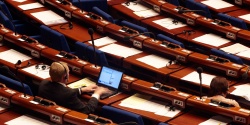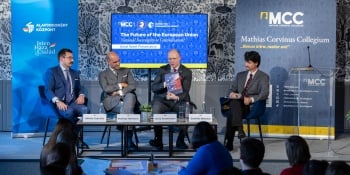Published: 10.05.2022

· The Conference on the Future of Europe organized in the European Union over the last year has come to an end. Its final recommendations lead to further federalization of the EU.
· This topic was the subject of a conference organized at the European Parliament in Strasbourg by the European Parliamentary Group Identity and Democracy.
· At the invitation of the organizers, the event was attended by Weronika Przebierała, director of the Ordo Iuris Center of the International Law.
In her speech, she pointed to the need to return to the Christian roots of Europe, without which the values set out in the EU treaties become only instruments for achieving political goals.
· She also discussed the threats of, inter alia, the inequality of the Member States in voting in the Council, the failure to respect the principle of subsidiarity by the EU, or the failure to define the role of the Court of Justice of the EU, which today is starting to make it a political tool instead of an independent authority.
· The Ordo Iuris Institute intends to continue its cooperation in the field of EU reform with MEPs who also oppose further federalisation of the Union.
The postulates of the Conference on the Future of Europe (CoFoE) assume, inter alia, depriving member states of the right of veto in the Council of the European Union. The recommendations also concern the creation of supranational electoral lists or the unification of the ordinance in elections to the European Parliament. They also included a postulate to establish an EU "constitution".
The Identity and Democracy Group asked Ordo Iuris to present the legal aspects of the recommendations published by the CoFoE Board of Directors. In her speech, Weronika Przebierała referred to the most dangerous recommendations of the Conference on the Future of Europe and pointed out that the return to principles and values is possible only by returning to the Christian roots of Europe.
“Certainly, the EU needs reforms, but not in the direction we are proposing through the recommendations prepared by the Conference on the Future of Europe. The preliminary analysis of the recommendations already indicates the efforts to concentrate power in Brussels and, as experience shows, in several other capitals, and the gradual elimination of the role of the governments of the Member States, ”emphasized the director of the Ordo Iuris Center for International Law.
"Returning to the principles and values, and to their actual observance, requires a return to the Christian roots of Europe and it seems to me that on this level we will observe one of the most important struggles for the future of Europe" - she added.
Weronika Przebierała also recalled the vision of European integration by one of the founding fathers of the EU, Robert Schuman, who emphasized that "European democracy will either be Christian or not at all".
"I think it is this lack of democracy that we are seeing today. The principles and values set out in the treaties have been instrumentalized and reduced to a function, and the mere reference to Christian heritage is seen as potentially discriminating against minorities. meaning of this word, leaving only its shell, which became a whip for states that dare to express their voice of opposition. (...) The European values set out in the treaties are beautiful and sound lavish, but without any reference to their source, it is very easy to subordinate them to ideology - which today we are clearly observing "- said the director of the Center of International Law during the conference.
In addition to constructive criticism of the direction in which the EU is heading, Weronika Przebierała also presented several reform proposals that would serve to fulfill the real goals for which the European Union was established. Among them, an important postulate that should penetrate the public debate is the introduction of solutions ensuring real equality in decision-making and voting of the Member States in the Council, and thus abandoning the double majority system. In the opinion of Ordo Iuris, the main role in the decision-making process should be played by the European Council composed of democratically elected heads of states, while respecting their traditions, including legal traditions, interests and culture. On the other hand, the European Commission, as an administrative body, should consist of officials who will only follow the directions given to them by the European Council - in this context, it will be important to reflect on the purposefulness of the privilege of a legislative initiative, which is currently enjoyed by the European Commission.
The director of the Center of International Law also drew attention to the need to emphasize and respect the principle of subsidiarity, which, although one of the pillars of the EU, has been strongly depreciated in recent years.
“The existing doctrine and jurisprudence of the Court of Justice have rightly argued that the essence of the principle of subsidiarity is - with the exception of areas falling within the exclusive competence of the EU - to make decisions at the level closest to citizens, i.e. authorities of the Member States. Moreover, the analyzes published so far by EU bodies indicate that failure to comply with the material aspects of the principle of subsidiarity also adversely affects the sphere of law-making in the European Union, leading to its "inflation", i.e. a decrease in the quality of regulations and their multiplication, ”she emphasized.
“I believe that the EU can be a community of nations that will jointly pursue economic goals and that this economic integration - as the Founding Fathers assumed of the Union - will also be a means of avoiding conflicts in Europe. Today we are at a turning point in history - the Union described in the treaties has only been described on paper, the reality has gone in the wrong direction, and we may have the last chance to stop it and start retreating. If it fails, the project will simply collapse in a few years, and the disgust that will remain for decades will stop any vision of transnational cooperation in Europe, ”concluded Weronika Przebiorła.
The speech by the director of the Center for International Law was met with great interest and received many votes of support. The event in Strasbourg was also an excellent opportunity to develop existing and new contacts with MEPs, which will allow the Institute to strengthen the alliance of people and organizations working to stop the federalisation of the European Union.

• Representatives of Ordo Iuris took part in the second round of consultations ahead of the 58th Session of the UN Commission on Population and Development (CPD58) on global health policy.

09.04.2025
• On April 8, the Ordo Iuris Institute presented the Polish version of a document with proposals for reforming the European Union, prepared jointly with Hungary’s Mathias Corvinus Collegium (MCC).


• The European Union’s Council Conclusions on EU Priorities in UN Human Rights Fora in 2025 identify key areas of EU human rights activities at UN fora and refers to several universal human rights, such as freedom from torture and freedom of religion or belief.